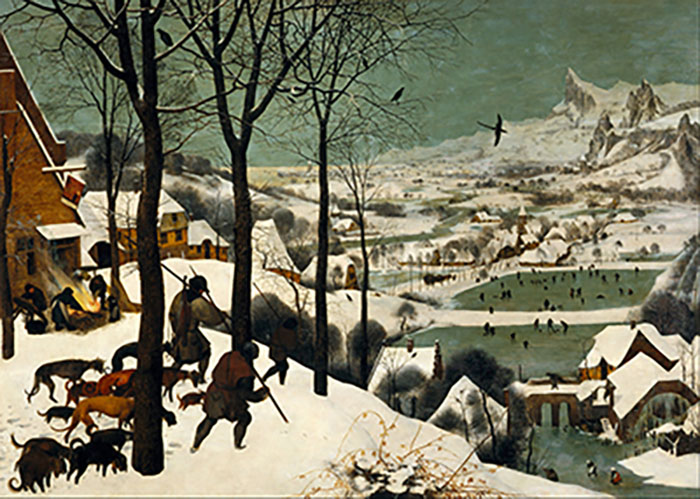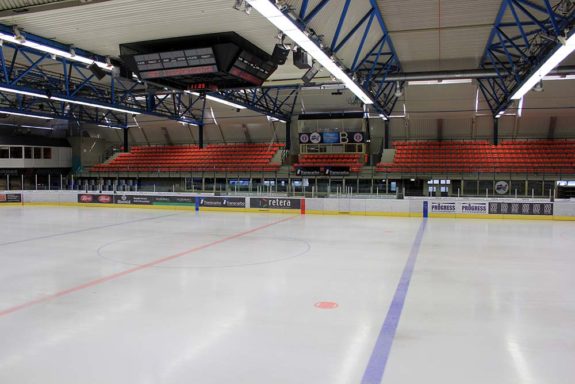As a two-part series, THW will examine the state of ice hockey in the Netherlands. In this first instalment, we’ll take a look at hockey’s early history, Dutch leagues and the national governing body.
What comes to mind when thinking of the Netherlands likely consists of canals, stroopwafels, cheese and windmills. When zeroing in on the sports world, everyone naturally makes references to speed skating and soccer and next to that, field hockey. But where does ice hockey fit into the sports equation of the small nation of approximately 17 million inhabitants?
From Humble Beginnings
Actually some of ice hockey’s earliest beginnings occurred in the Netherlands. Dating back to the sixteenth century – after the Dutch had perfected the metal ice skate – an early version of a mixture of golf and hockey called kolven was played on frozen canals and ponds. The occurrence of such a game is documented in Pieter Brueghel’s The Hunters in the Snow painting found below.

Off in the distance to the right, you can see people playing a game with a stick on the frozen pond. As Europeans immigrated to North America, they brought with them their unique sports. A blend of these customs would come together and become the game of ice hockey that we know today.
Hockey Leagues in the Netherlands
Fast forwarding ahead several hundred years, lets look at the state of ice hockey in the Netherlands today. There’s actually no professional league in the Netherlands. Some players earn money, including import players, but they still have to support themselves through other work.
The top league in the Netherlands is the Jack’s Casino Eredivisie, but struggles to attract attention because of its disparity. The team from Tilburg is head and shoulders above the rest of the competition in the league, and therefore, makes it uninteresting. Currently, five teams are competing in the league, down from seven a year ago. Noticing a need for change, league restructuring is on its way.
“Tilburg and Heerenveen will join the Oberliga in Germany as already agreed on with the Deutsche Eishockey-Bund (DEB),”says Arnoud van Berkel, Executive Director, Ice Hockey Association of The Netherlands. “The remaining teams along with some teams from the Eerste Divisie (the league below the Eredivise) and some teams from Belgium will organize a new top league with a lower budget, a limited amount of import players, a salary cap and conditions on development, coach education, game officials, etc. We still have a lot to do on that.”
The Dutch Governing Body
The Ice Hockey Association of the Netherlands (Nederlandse Ijshockey Bond – NIJB) is governing all ice hockey initiatives within the country. The NIJB is responsible for development, education, the national team program, club support and partners with other national organizations ( the Dutch Olympic Committee, the government and the anti-doping program) and also partners with the International Ice Hockey Federation (IIHF).
“I’ve been the executive director for two years now. Before I was a referee, referee supervisor, referee-in-chief (and I still am) and board member. Next to that, I am an IIHF instructor and supervisor,” says van Berkel. “I am an employee of the federation for (officially) 1.5 days a week. The other days I am working for a high school as a teacher and administrator.”

The NIJB office is in Eindhoven where working is a full-time technical director (Theo van Gerwen), a full-time office manager (Wilma Olijhoek) and a full-time talent coach (Bo Subr), as well as the many volunteers who help out.
There, they’ve also started a national ice hockey academy (NIJA) where young talent from all over the country are practicing every day on and off the ice, while they live and go to school in Eindhoven. They play as part of a team that is playing in the Eerste Divisie. Unfortunately, the NIJA is not financially supported by the government, Dutch Olympic Committee, or sponsors. The NIJA is fully supported by the NIJB and by the participating players. Two years ago, the NIJA was supported by the municipality of Eindhoven, the Noord-Brabant province and the Dutch Olympic Committee. However, a change in policy dictates that only “medal sports” (sports being played at the top international level) are supported.
Check out part two of our series where we discuss the challenges of growing the game in the Netherlands and the country’s presence on the international stage.